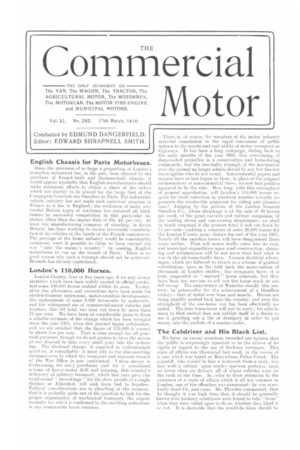The Cabdriver and His Black List.
Page 1

Page 2

If you've noticed an error in this article please click here to report it so we can fix it.
We have, on recent occasions, recorded our opinion that the public is surprisingly ignorant as to the End cut of its rights in regard to the use of hackney carriages. This slate of affairs was illustrated last week, in the course of a ease which was heard at Marylehone Police Court. The plaintiff, who wished to hire a motoreah from a rank, was met with a refusal, upon sundry specious pretexts, from no fewer than six drivers, aR of whose vehicles were on the rank at the time. In order to draw attention to the existence of a state of affairs which is all too eornmon us London, one of the offenders was summoned he was eventually fined 1 Os. and costs. Mr. Plowden commented, that he thought it was high time that. it should be generally known that hackney cabdrivers were bound to take "fares" when they were called upon to do so, whether they liked it or not. It is desirable that the. would-he hirer should be fully cognizant of the legal obligations of the cabdriver towards him, and that there should be an end to the sense of uncertainty which affects the relations between this employer and his employed. Such risk of refusal discourages the non-assertive passenger, from whom much custom should come.
There is, however, it must be at once admitted, another side to this question, and especially to the drivers' boycotting attitude, the prevalence of which was demonstrated in the police-court case which is mentioned above_ Those who have been associated with any form of publictransport service are unpleasantly familiar with the pessenger who is almost a professional grumbler. It is a fact that such individuals are about in considerable numbers, and in no centre more so than in the Metropolis. Many of them have nothing better to do. Others are sticklers for the meticulous observation of regulations,
solely because they are regulations. A few of these habitual complainants endeavour to make money as a result of their perspicacity, and, unfortunately, it is often found to be cheaper to submit to this class of blackmail than to dispute claims which are made in regard to imaginary personal damage. An instance of this class of passenger is known to us. If a spot -of oil accidentally got inside a motorbus, it was this passenger that invariably managed to get it on to some new garment, and this gar meat was always a most-expensive one. Claims of this nature, when personal damage or injury was alleged, were regularly varied by a few : on one occasion, it u-as stated to be due to the sudden starting or stopping of the vehicle; on another, to contact with a dirty apron; or, again, to the discovery of a protruding rivet on the coachwork. The most-troublesome " fare" for a driver, however, is the one who, with no other inducements than the possible publicity which may ensue and the satisfaction of feeling that " in the public interest, he is standing up for his rights," constantly forwards complaints of little moment to train, tram, bus or cab owners. It is a fact that these complainants very soon become known to the driver, and an effective ticycott is the result—illegal though such a remedy is. In London, we could adduce the actual eases of a number of individuals whose patronage by cab drivers is shunned like the plague; hut conductors and drivers of stage carriages have not the same opportunity of avoiding what to them is undesirable company.
Whilst we urge the desirability of the public's being familiarized with the regulations which govern its dealings with those whose business it is to transport them through the streets or on the railroads, we plead, from bitter personal experience, for the discouragement of the professional complainant.
























